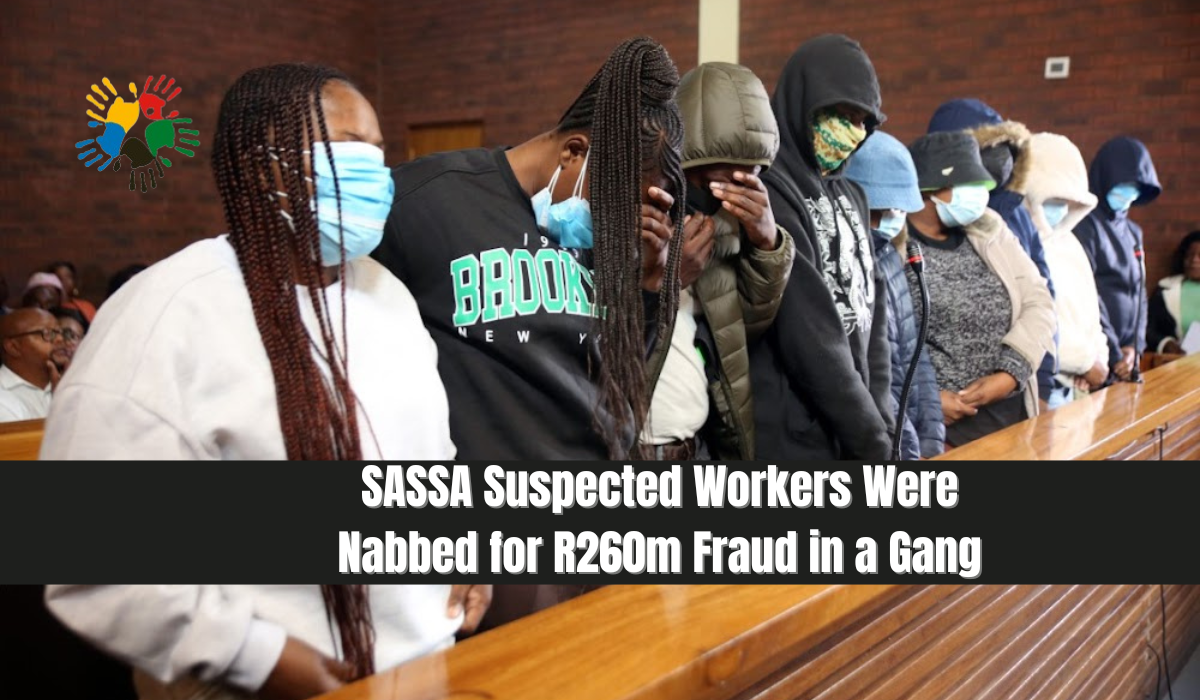SASSA Suspected Workers Were Nabbed for R260m Fraud in a Gang

SASSA Suspected Workers Were Nabbed for R260m Fraud in a Gang. In a shocking case of financial fraud, law enforcement authorities have arrested 11 suspects linked to a major corruption scheme involving ghost SASSA cards. The fraudulent operation allegedly siphoned over R260 million from the South African Social Security Agency (SASSA) grant system, which was meant to support genuine beneficiaries. Among those arrested, eight are reported to be SASSA employees, raising concerns about internal fraud and possible security breaches within the organization.
This case has brought renewed attention to the vulnerabilities in South Africa’s social grant system and the need for stricter security measures to prevent future scams. In this article, we will explore the details of the fraudulent scheme, the impact of the arrests, and the broader implications for SASSA beneficiaries and law enforcement agencies.
How the Fraud Was Uncovered
The fraudulent scheme was uncovered after an extensive investigation into irregular financial activities within SASSA’s payment system. The authorities discovered that a syndicate had been operating for an undisclosed period, creating fake beneficiary accounts linked to fraudulent SASSA cards. These ghost accounts were used to withdraw social grant funds, diverting money intended for legitimate recipients.
Discoveries in the Investigation
| Aspect | Details |
|---|---|
| Number of Suspects Arrested | 11 individuals, including 8 SASSA officials |
| Fraudulent Amount Stolen | Over R260 million |
| Nature of the Fraud | Creation of ghost SASSA cards and fake beneficiary accounts |
| Charges Filed | Over 1,000 counts of fraud |
Arrests and Law Enforcement Response
The South African police and other law enforcement agencies have played a crucial role in apprehending the suspects. According to Andile Tshona, SASSA’s Senior Manager for Media Relations, the investigation remains active, and additional arrests may follow.
Tshona confirmed that the 11th suspect surrendered voluntarily, which suggests that some individuals involved in the scam may be cooperating with authorities. He also acknowledged that while many of those arrested were SASSA employees, others outside the agency may have played a role.
“Looking at the number of arrests that have been made so far, it does look like a syndicate because it is not just SASSA officials that have been arrested.” — Andile Tshona
How Did the Fraud Happen?
The investigation is still ongoing, but authorities have identified several potential methods used by the fraudsters to steal grant funds:
1. Creation of Ghost SASSA Cards
Fraudulent SASSA cards were allegedly linked to fake beneficiary accounts. These cards were then used to withdraw social grants illegally.
2. Insider Access to Payment Systems
With eight SASSA employees among the arrested suspects, there is strong evidence that the scheme was an inside job. These individuals had access to the grant distribution system and may have manipulated account details to divert funds.
3. Possible External Hacking
Authorities have not yet confirmed whether external hackers were involved, but there is speculation that cybercriminals could have assisted in accessing sensitive payment data.
4. Exploiting System Weaknesses
The fraudsters may have identified loopholes in SASSA verification process, allowing them to approve payments to ghost beneficiaries.
Impact on SASSA Beneficiaries
The fraudulent activities have serious consequences for genuine SASSA beneficiaries. Here’s how:
1. Delayed or Disrupted Grant Payments
The stolen funds could have been used to provide financial assistance to thousands of needy individuals. Some beneficiaries may experience delays in receiving their payments due to the fraud investigation.
2. Increased Scrutiny and Tighter Security Measures
SASSA may introduce stricter verification processes, which could make it harder for legitimate applicants to access grants quickly.
3. Public Trust in SASSA May Decline
Cases like this undermine confidence in SASSA’s ability to manage social grants efficiently. Many South Africans depend on these funds for survival, and any signs of corruption create widespread concern.
Legal Consequences for the Accused
The 11 arrested suspects, including eight SASSA employees, face serious legal repercussions. They are charged with over 1,000 counts of fraud, which could lead to lengthy prison sentences if convicted.
Possible Charges and Penalties
| Charge | Possible Penalty |
|---|---|
| Fraud | Up to 25 years in prison |
| Corruption | Fines and up to 15 years in prison |
| Money Laundering | Confiscation of assets and long-term imprisonment |
| Cybercrime (if proven) | Additional penalties under digital fraud laws |
Authorities are working to recover stolen funds and ensure that those responsible are held accountable. The case will serve as a warning to others who might attempt to exploit South Africa’s social welfare system.
What SASSA Is Doing to Prevent Future Fraud
In response to this scandal, SASSA has pledged to strengthen its security systems and implement new measures to prevent similar fraud in the future.
Planned Measures
| Security Upgrade | Expected Outcome |
|---|---|
| Biometric Verification | Ensures only verified individuals receive grants |
| Stricter Employee Background Checks | Prevents corrupt officials from working within SASSA |
| Advanced Fraud Detection Software | Identifies suspicious transactions in real-time |
| Regular Audits and Investigations | Reduces opportunities for internal fraud |
SASSA has also urged the public to report any suspicious activities related to grant payments. Beneficiaries who notice irregularities in their accounts are encouraged to contact SASSA support immediately.
Conclusion
The arrest of 11 individuals, including eight SASSA officials, in connection with a R260 million fraud scheme is a wake-up call for South Africa’s social security system. This scandal highlights the risks of internal corruption, the potential involvement of cybercriminals, and the need for stricter security measures in grant distribution.






